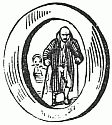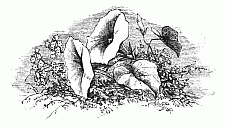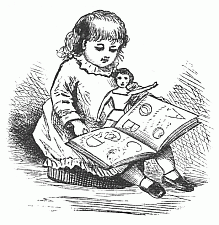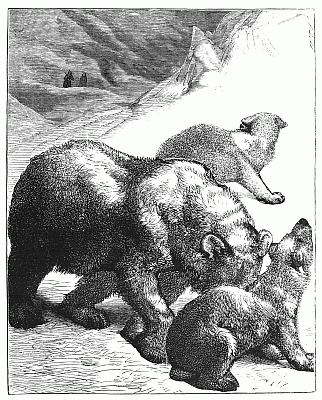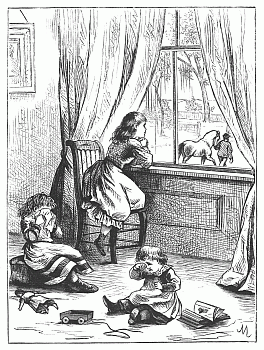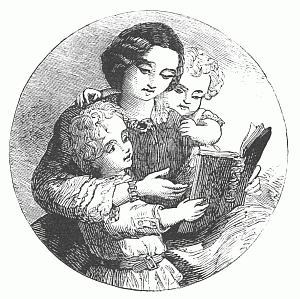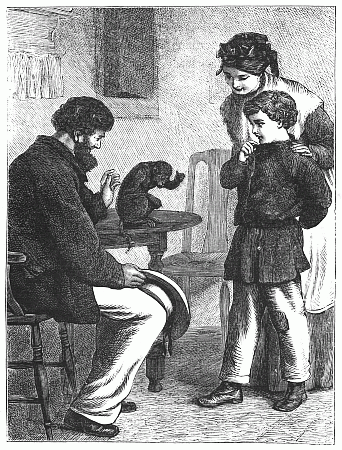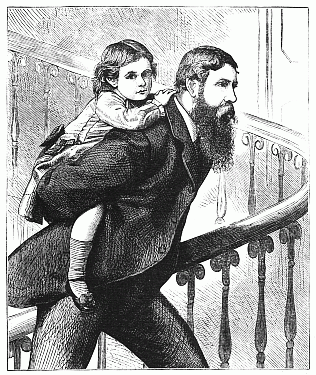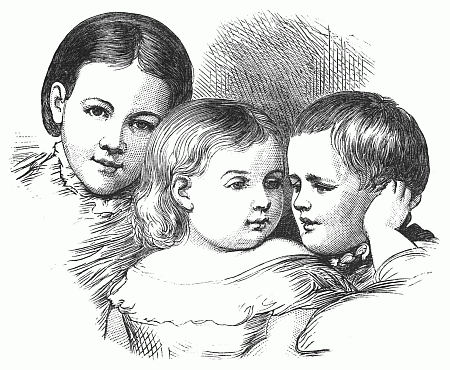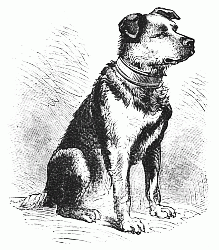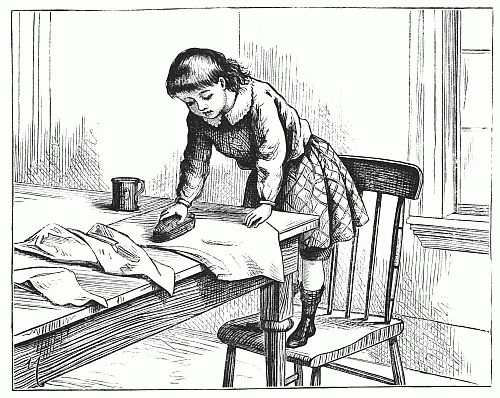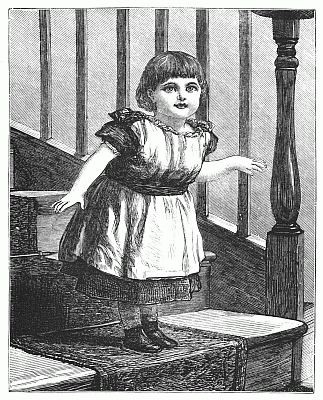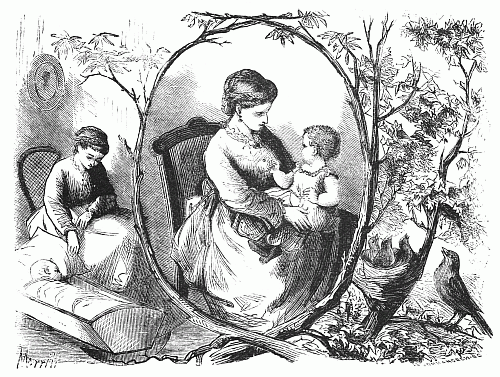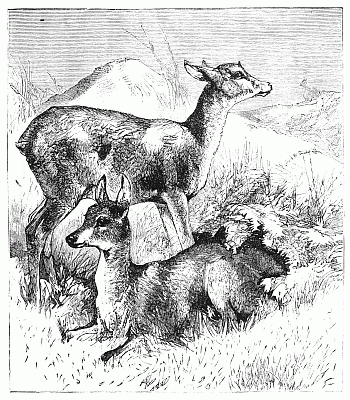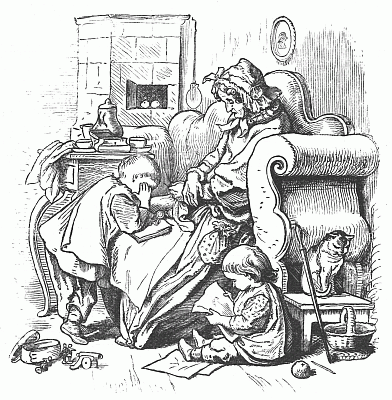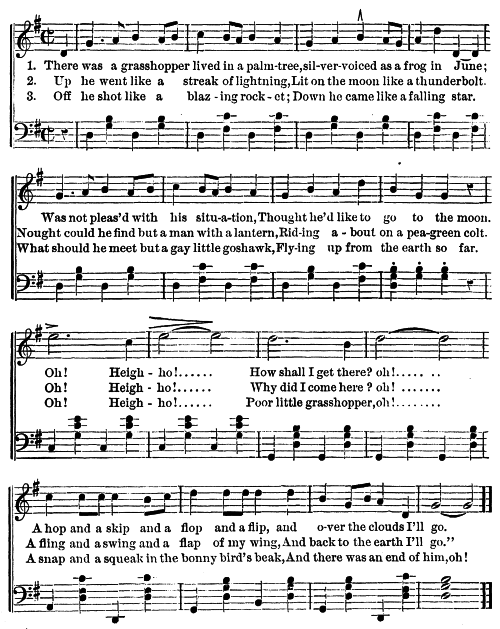Project Gutenberg's The Nursery, April 1878, Vol. XXIII. No. 4, by Various
This eBook is for the use of anyone anywhere at no cost and with
almost no restrictions whatsoever. You may copy it, give it away or
re-use it under the terms of the Project Gutenberg License included
with this eBook or online at www.gutenberg.org
Title: The Nursery, April 1878, Vol. XXIII. No. 4
A Monthly Magazine for Youngest Readers
Author: Various
Release Date: February 20, 2009 [EBook #28143]
Language: English
Character set encoding: ISO-8859-1
*** START OF THIS PROJECT GUTENBERG EBOOK THE NURSERY, APRIL 1878 ***
Produced by Emmy, Juliet Sutherland and the Online
Distributed Proofreading Team at http://www.pgdp.net. Music
by Linda Cantoni.
THE
NURSERY
A Monthly Magazine
For Youngest Readers.
VOLUME XXIII.—No. 4.
IN PROSE.
| | PAGE |
| Tired Out | 98 |
| Emma and the Book | 101 |
| The Bear and Her Cubs | 103 |
| How Two Boys Were Made Happy | 107 |
| The Summer Shower | 109 |
| A Monkey Story | 110 |
| Drawing Lesson | 113 |
| What Bravo Told Rory | 116 |
| Playing the Chinaman | 119 |
| Pansy's Secret | 120 |
| Sagacity of the Deer | 125 |
IN VERSE.
| | PAGE |
| The Herons | 100 |
| Billy Brown Sold | 105 |
| Time to Go to Bed | 114 |
| A Trotting Song | 123 |
| Grandma Asleep | 127 |
| The Lay of the Grasshopper (with music) | 128 |
[97]
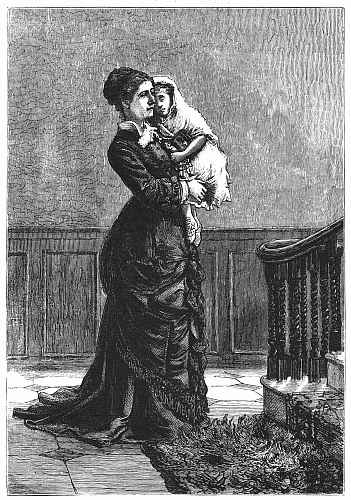 TIRED OUT.
TIRED OUT.
[98]
TIRED OUT.
NE day Miss Lily Macnish heard the door-bell
ring. She put down her spelling-book, and
asked, "Who can that be, mamma?" Before
mamma could give an answer, Jane the housemaid
entered, and handed her a note.
"Why, this is not for me: it is for you, my dear," said
Mrs. Macnish, giving the note to Lily.
"For me!" said Lily, while her cheeks flushed; for it
was the first note she had ever received.
"Please read it for me, mamma," she said; for Lily could
not read handwriting quite as well as some little girls of
her age that I could tell of.
"It is an invitation to a children's party at Mrs. Vane's,"
said mamma. "Miss Lucy Vane asks the pleasure of Miss
Lily's company on Thursday evening, at seven o'clock."
"Oh, can I go? Can I go?" cried Lily, jumping up, and
clapping her hands.
"I do not quite approve of children's parties, especially
when they take place in the evening," said mamma. "But
I know who will say 'Yes,' and I suppose I shall have to do
as he says."
She was thinking of Lily's papa, who loved the little girl
so much, that he could not bear to say "No" to any request
she might make.
Well, mamma was right. Papa saw that his little girl
was bent on going to the party, and so he teased his wife
into yielding her consent.
So, when Thursday came, Lily was dressed up in her little
white robe, with straw-colored ribbons, and her pretty
slippers, and sent in a carriage, with Jane the housemaid,
to the party.[99]
It was not quite such a party as I approve of. I do not
like to see little girls and boys trying to act like grown-up
people. I like to see them act like children.
Lily had the good taste to get tired of it all very soon.
Little girls would come along and stare at her slippers; but
she did not feel much pride in them. Little boys would
come and bow, and ask her to dance; but she had had
enough. There was music and singing, and then ice-cream
and cake were handed round; but Lily had promised to eat
nothing, and she kept her promise.
At half-past eight o'clock she saw Jane beckoning to her
at the door; and very glad she was at the sight. Bidding
Miss Vane "good-night," she let Jane put on her shawl, and
lead her to the carriage. "Oh, I am so tired, so tired!"
said poor Lily.
Mamma received her at the door of her own house, and,
taking her in her arms, bore her up stairs to the little girl's
papa. "What! has she come back so soon?" said he,
throwing down his newspaper, and taking her on his knee.
"Oh, you dear papa, I am so tired, so tired!" murmured
Lily. "Oh, do sing me 'Flow gently, sweet Afton,' and let
me go to sleep on your lap."
But mamma said, "No, Lily. You must go to bed while
you can keep your eyes open."
And so Lily kissed papa, and was borne off to bed. I
think she will wait till she is older, before she will care much
to go to another "children's party."
Dora Burnside.
[100]
THE HERONS.

|
A very shy bird
Is the heron, my dear;
It will run fast away,
If you come very near:
It has a sharp bill,
A neck slender and long;
It is fond of small fish,
And goes where they throng.
It builds a snug nest
On some very high tree,
And there lays its eggs,
Where the boys cannot see.
Woods marshy and wet,
It likes to frequent;
For there it finds food,
And there lives content.
No sportsmen with guns
Come often to kill:
And when they appear
The heron keeps still;
It keeps still and hides
On a lofty bough near,
Till the fowler says, "Well,
I can find no birds here."
Then he and his dogs
Go off in the dumps,
And the heron flies down
To the bushes and stumps;
There flaps its big wings,
Right glad to have cheated
The life-seeking foes,
Who now have retreated.
|
Ida Fay.
[101]
EMMA AND THE BOOK.
One day little
Emma said
to herself, "It is
about time that
I knew how to
read. I wonder
if I could read
that big book on the table."
So she went to the table, and
tried to reach the book; but it
was too high up.
Now, Emma had a brother
Fred, who was older than she
was. Fred was always very
kind to Emma, and now he
said, "That is not such a book
as you would like, but if you[102]
will be quiet, I will read you a
story out of my own book."
It was a pretty little story
that he read; and Emma stood
very still, and listened to every
word. "Now," said she, "will
you please let me have the
book, Fred; for my dolly likes
stories too, and I want to read
to her." So Fred gave her the
book, and she sat down and
read to her doll.
Wilhelmina Grant.
[103]
THE BEAR AND HER CUBS.
"Are there any people besides Esquimaux in the snow-country?"
asked Harry, one day.
"Not many," said I. "There is a small Danish settlement
in Greenland; but, with that exception, the Esquimaux[104]
and the bears have the country pretty much to
themselves."
"Tell me about the bears," said Harry. "I saw a bear
last summer at the White mountains. He was chained to a
tree."
"But the bear that roams about over the snow and ice of
the Arctic regions, is much larger and more savage than the
common black bear that you saw. It is of a dingy white
color. When full grown, it sometimes measures nine feet
in length."
"Didn't I see one in Barnum's menagerie?"
"I think not, Harry; for the polar bear suffers so much
from heat, even in our coldest winters, that it will not live
long in this climate.
"There is one thing very interesting in the bear nature,
and that is the affection of the female for its young. This
has often been noticed. Here is a picture showing an
instance of it.
"A Greenland bear with two cubs, was pursued across a
field of ice by a party of armed sailors. At first she tried
to urge the young ones along by running before them,
turning around and calling them to her; but finding that
the pursuers were gaining upon them, she pushed and threw
the cubs before her, one after the other, until she effected
their escape.
"Each cub would place itself across her path to receive
the impulse, and when thrown forward, would run onward
until overtaken by the mother, when it would adjust itself
for another throw."
"Well, that shows that even a bear has some good feeling,"
said Harry, "and some common sense too. I'm glad
that the sailors did not catch them. What would those cubs
have done without their mother?"
Uncle Charles.
[105]
BROWN BILLY SOLD.
Edith, with cheek against the window,
Is sobbing out her grief;
Gold-Locks is in a sad condition
Of pocket-handkerchief.
And Teddy at his play is sniffing,
His little nose all red!
Is Tony sick? Is pussy stolen?
[106]Is the canary dead?
Else why this universal crying?—
Weepingly I am told,
With many a look of indignation,
"Brown Billy has been sold!"
And why? No one can tell the reason;
And yet I chance to know,
It was—ah, wicked little pony!—
Because he acted so.
Sometimes the phaeton all too heavy
Would grow for him to draw;
You'd think his feeble strength must perish
Under another straw.
Sometimes as light as any feather
He rolled its dainty wheels,
Humming and whirring like a spindle
After his flying heels.
And, worse than that, he had a fashion
Of rearing in the air;
And what became of load or driver
He did not know nor care.
Yet, without least alarm, the children
Would laugh at him, and say,
"Do see dear, cunning, old Brown Billy:
[107]How well he likes to play!"
And bits of apple, lumps of sugar,
From little hands were given,
With fond pet names, and soft caresses,
And sometimes kisses even.
Brown Billy, but for your wild frolics
We might have had you yet;
And then these three sweet doleful faces
With tears would not be wet.
Mrs. Clara Doty Bates.
HOW TWO BOYS WERE MADE HAPPY.
May I tell the readers of "The Nursery" how happy
two little boys were made this evening by the arrival of
a present from a kind friend? And what do you think it
was? A magazine with a green cover, on which Guy, one
of the boys, pointed out these letters, "N-U-R-S-E-R-Y."
Max, with his chubby hand, turned to the first page, and
found the Christmas-tree, with the baby and flag at the
top. Then mamma had to read the story, and, after it
was finished, the same little hand turned the leaf back; for
the blue eyes wanted to see baby Arthur again.
Then how both pairs of eyes looked at Teddy with his
new sled! and, while mamma read to them the pretty verses
of Teddy's mamma, they were still as mice.
And how their eyes sparkled when they saw the picture
of the wheelbarrows and cart loaded with earth! for this
was just the way they used to play in the warm pleasant[108]
weather. They thought the three little boys must have
had lots of fun.
Then they wanted to hear about "Georgie's Pet Mouse,"
and "Bess and the Kitten." They did not wonder that
"Baby" felt cross at having his picture taken; for Max
had to sit still so long, and so many times for his, that he
knew how to pity the poor baby.
The "Rooster" pleased them very much; and mamma
promised to take "The Nursery" to the Kindergarten,
and draw the rooster on the board for the little children
there.
When we came to "Bed-time," mamma thought it would
be just the thing to read last, before putting her little
boys to bed. But they begged for one more story, and
just one more, till we came to "By-lo-land," and after
hearing that read, they wanted me to sing it to them.
Then the night-dresses were brought, and snugly in their
little bed the brown eyes and blue eyes were closed, and
my happy little boys went "over the hills to By-lo-land."
Mrs. F. A. B. D.
[109]
THE SUMMER SHOWER.
Well do I remember dear old aunt Rachel, as we called
her, my first schoolmistress. She wore spectacles, and I
have heard it said that she sometimes took snuff; but, if she
did, she was careful not to do it in the presence of her
pupils.
She was the aunt of nobody in particular; but, had she
been aunt to all of us, she could not have taken more pains
to keep us from harm, and to lead us in the way of right.
One day, just as school was dismissed in the afternoon, a
severe rain-storm began. "Oh! how shall I get you all[110]
home," said the dear old lady, opening the door, and looking
up at the clouds.
First she fitted me and my little sister Eva out with her
best umbrella, and told us to make the best speed we could,
and send the umbrella back.
As for the boys, they ran out, rejoicing in the rain, and
well pleased at the prospect of getting wet through. The
other little girls were kept waiting till the sky should clear,
or some one should come for them.
My sister and I started off, side by side, under our
umbrella. It was a large cotton one, with a long, heavy
handle,—just about suited to the capacity of a giant. But,
by taking hold very high up, I managed to carry it without
any trouble, and it kept us both dry. We really enjoyed
our walk; and, the harder the rain came down, the better
we liked it.
No sooner had we got home than the clouds broke, and
patches of blue sky began to appear. Then Eva spied a
rainbow. So mother told us to put on dry shoes and stockings,
and take back the umbrella.
How glad Aunt Rachel was to see and welcome us! "I
am so glad you did not get wet," said she; "but, as for those
wild boys, they would rush out into the rain, and I could
not keep them from it."
Ida Fay.
A MONKEY STORY.
This is one of the true stories that I tell my little boys
over and over again, as we sit before the fire, and make
ready for their journey to "Sleepy-Land."
"When your grandfather was a lad about twelve years
old, an uncle of his made a voyage to South America, and[111]
brought home as a present to his nephew a fine large monkey.
Of course Master Richard was very much pleased;
and the frolicsome pet would have had a warm welcome
from the whole household, had not the uncle seen fit to
report some of Jocko's pranks on shipboard.
[112]
"This put the young ladies upon their guard. But old
Bella, the cook, never seemed prepared for his capers; and
the fuss she made over them pleased Jocko so much, that
she became the object of his attacks.
"One day Bella went to the city, and brought home a
fine new bonnet in a large bandbox. During the evening
she showed it with great pride to the young ladies; and,
unknown to her, Jocko enjoyed the sight of the ribbons
and laces and flowers from behind the parlor sofa.
"Like Bella herself, he was fond of finery; and the bonnet
seemed to him a very fit garment for a monkey to wear.
So the next morning, while Bella was busy in the kitchen,
Jocko went to her closet, took out her bandbox, dressed
himself in the bonnet, and stole down the back-stairs.
"Bella, hearing a noise, looked around, and there he was,
his head literally lost in a sea of red and yellow ribbons.
With a shout of rage, she seized the broomstick, and hurried
after the thief. But before she could reach him, Jocko had
mounted two flights of stairs, leaped out on the porch, and
climbed up to the roof of the house.
"There he rested; and there he was when the whole
household, frightened by Bella's shrieks, came running up
to see what was the matter. In vain Bella scolded. In
vain Richard coaxed and threatened. Jocko would not
come down until he had finished his work; for he was busily
engaged in tearing poor Bella's bonnet into fragments.
"As ribbon after ribbon was destroyed, her screams grew
louder and louder; and nothing could move her from her
determination to kill the monkey, except the promise of a
gayer bonnet than the one that Jocko had stolen.
"But Jocko never was forgiven; and the poor fellow
would have gone supperless a great many times, had it not
been for his devoted young master."
Mrs. G.
[113]
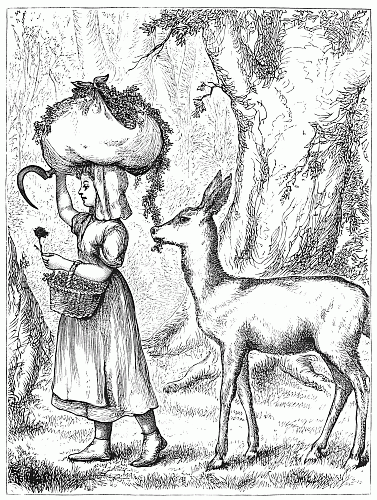 DRAWING-LESSON.
DRAWING-LESSON.
[114]
TIME TO GO TO BED.
DAUGHTER.
"Why must I go to sleepy-land, sleepy-land, sleepy-land?
Why must I go to sleepy-land
So early in the evening?
I'd like to stay up longer, pa, longer, pa, longer, pa;
I'd like to stay up longer, pa:
To sleepy-land it is too far,
So early in the evening."
FATHER.
"'Tis time to go to bed, my dear, bed, my dear, bed, my dear;
'Tis time to go to bed, my dear,
Though early in the evening.
For such a little girl as you, girl as you, girl as you,
For such a little girl as you
Should be abed, and sleeping too,
Thus early in the evening."
DAUGHTER.
"Oh! then I'll sing another song, another song, another song;
Oh! then I'll sing another song,
So early in the evening!
For you must take me pick-a-pack, pick-a-pack, pick-a-pack,
For you must take me pick-a-pack,
My good papa, upon your back,
So early in the evening."
[115]
FATHER.
"Then jump, and we'll go up the stairs, up the stairs, up the stairs;
Then jump, and we'll go up the stairs
So early in the evening.
Now here she is! My pig is safe, pig is safe, pig is safe,
Now here she is! My pig is safe:
It must not squeal, or kick, or chafe
So early in the evening."
[116]
DAUGHTER.
"So up we go! Good-by, mamma, by, mamma, by, mamma;
So up we go! Good-by, mamma,
So early in the evening!
I'm going off to sleepy-land, sleepy-land, sleepy-land,
I'm going off to sleepy-land:
To all good folks I kiss my hand,
So early in the evening!"
Emily Carter.
WHAT BRAVO TOLD RORY.
"Tell us a story, Kate," said Emma.
"Yes, do," chimed in Bertha.
"Will you tell us a story?" said Herbert.
Thus entreated by these dear, good children, I could not
refuse. So while their three heads, close together, with their
bright faces beaming upon me and upon each other, formed
a pretty picture, I told them this story about two shepherd-dogs,
Bravo and Rory:—
"When farmer John and his bride moved into their little white house,
a mile from the old homestead, they took with them the young dog,
Bravo, and left Rory to guard the old house. Bravo was large and
wide awake, but only five months old. He seemed very happy in his
new home. His master taught him many curious things; and for a
week or more he showed no signs of home-sickness.
"But when old Toss, from the tannery near by, made an attack upon
him, although Bravo's fleetness saved him from harm, he began to wish
he had never left his puppy-hood's home to live with farmer John. Down
he sat at the door of his kennel, with a lonely and forsaken look, trying
to smooth down the hair of his sleek coat that old Toss had ruffled.
"The tanner's dog repeated his attack for two or three days, and,[117]
more than that, drove poor Bravo from his nice warm quarters at night,
compelling him to lie out in the cold. Then Bravo said to himself,
'Something must be done. I dare not fight Toss; for he has long teeth,
and is a savage dog,—more than a match for me. I think my best plan
is to go and tell Rory.' And away he sped, just at sunrise, and came back
in time for breakfast, with a cheerful look in his face.
"Now, Rory was steady and brave and wise. He had no love for
running round nights: so it surprised his master, when, just as the sun
went down that day, Rory started down the road, and up the lane to
farmer John's. On he went, with a grave look, without stopping to greet
any old friend, even by a wag of his tail. Bravo met him, and whisked
around him; and, after a short consultation, the two dogs crawled into
the kennel, Rory staying nearest to the door.
"The moon shone clear and bright, and all was still until about midnight,
when farmer John's wife was suddenly awakened by a sound of
growling, snarling, and yelping. 'Wake up, John, quick, quick! Get
up!' she shouted. The farmer leaped from his bed, and, half-dressed,
ran to the door, thinking that the dogs were killing sheep; but instead
of sheep, Rory and Bravo had Toss at their mercy, and were giving him
a fearful punishment."
[118]
"Good, good!" shouted Herbert. "That served him
just right."
But little Bertha turned a wondering look upon Herbert;
she could not help feeling pity even for Toss.
"Let us hear the rest of the story," said Emma.
So I went on,—
"The sharp voice of the farmer made Rory and Bravo release their
victim; and Toss, in a crestfallen way, started for his home; but, before
he could get over the fence, Rory gave him a final clutch that sent him
off yelping. He never came back; and when he met Bravo afterwards,
he was careful not to trouble him.
"In a short time Bravo grew to be so strong and brave, that he could
fight his own battles without the aid of his friend Rory."
The three children, who had listened very attentively to
the story, now talked it over; and they came to the conclusion
that Toss received a good lesson, and was probably a
better dog after it. "For," said Herbert, "a dog who
abuses a smaller dog is almost as mean as a big boy who
tyrannizes over a little boy."
M. Kate Brawley.
[119]
PLAYING THE CHINAMAN.
Franz is a little boy about four years old, who lives in
Brooklyn, California. His favorite play is to take some
pieces of cloth, fill his mouth with water, turn his head
from side to side, letting the water squirt from the corners
of his mouth upon them (as he has seen the Chinamen do
at the laundry), fold them, turn the iron-stand on its back,
and carefully smooth them. This is Foo Lee, washing and
ironing.
Sometimes the clothes are not wet enough, and the
sprinkling goes on with the ironing.
"Your clothes will smell of tobacco and opium, if you
sprinkle them so much," says Franz's elder brother.
"No, they won't," says the little wash-man. "Me do
them good; me do them cheap."[120]
When he gets tired of this, he puts his wash into a piece
of paper, and takes the bundle to mamma. "I hope the
clothes are not too blue, John," says mamma.
"No," answers Foo Lee. "They done good this time."
"And did you find my stockings, which were missing from
last week's wash?"
"Yes, they all here. I found them: they all right this
time,—fifty dozen."
"How much shall I pay you?"
"Six bits." (Seventy-five cents.) "I do them velly
cheap."
Mamma gives him two buttons,—one large one for the
four-bit piece, (fifty cents), and a smaller one for the two
bits (twenty-five cents).
"Thankee. Good-baah!" says Foo Lee. "Good-by,"
returns mamma.
L. M.
PANSY'S SECRET.
Pansy had a secret, and nobody could find it out. She
would come down stairs in the morning, and seat herself at
the breakfast-table, and then papa would say, "Well, Pansy,
are you going to tell us your secret to-day?"
Pansy would shake her head, and reply, "You must guess
it, papa! Can you not guess it?"
"Well, I guess you have a new tooth coming."
"Oh, no, that is not it. Mother can guess better than
that, I think. It concerns you, mother."
"Well, I guess," said mother, "that you are to have the
present of a kitten from aunt Julia."
"And I guess," said brother John, who was five years[121]
older than Pansy, "I guess you are knitting a pair of
woollen cuffs for papa."
"You are all wrong," cried Pansy, "and I shall not tell
you my secret to-day."
The next morning, as she was coming down stairs, she
paused, and said to herself, "Shall I tell them my secret[122]
now? No, Pansy, let them see that you can keep a
secret."
No sooner was she seated at the table in her high-chair,
than papa said, "Well, Pansy, how much longer are you
going to keep us in the dark? Are you going to tell us
your secret?"
"Not yet, papa," said Pansy, looking up with a roguish
smile.
"What can it be?" said mother, laying down her knife
and fork, and putting her hand to her head.
"I don't believe it is any thing of any account," cried
brother John. "She wants to keep us curious."
"Well, I think Pansy must be learning a new piece to
recite," said her mother.
"That's not it," said Pansy. "It's a 'portant secret: one
that my mother will like to hear."
"Oh, it's important, is it?" said papa. "I do wonder
what it can be."
"Mother, what day was it that you lost your wedding-ring?"
said John.
"Don't speak of it, John. It was more than a month
ago. I have hunted high and low, and cannot find it. I
would have given all my other jewelry rather than have
lost it."
Here Pansy turned red in the face, got down from her
high-chair, and ran out of the room.
"Did you see that?" said papa. "The little rogue has
found the ring, and that's her 'portant secret."
In a minute Pansy came back, holding up the ring, and
her face radiant with delight. "I found it, mother, among
my doll's things. You must have dropped it there when
you were fixing them."
And so little Pansy's secret was out at last!
Dora Burnside.
[123]
A TROTTING SONG.
Up and away! now up and away!
We've a good long journey before us to-day.
The road is smooth, and the sky is bright:
Whoa, now! My darling, hold on tight!
There's joy in the saddle. We'll scour the plain
With a gentle trot and an easy rein;
And, as we journey the way along,
I'll sing my darling a trotting song.
Up and down!
Up and down!
And over the hills to Sleepy Town!
Fast or slow,
Soon, we know,
[124]Into the land of nod we'll go.
Oh, dear me!
Right off my knee,
Into a hollow I didn't see;
And baby small,
On steed so tall,
Came near getting a horrid fall.
She's not afraid,
My little maid,
Too oft on her that trick is played;
And good is she
As good can be,
If I'll only trot her upon my knee.
Over she goes!
But don't suppose
I'll let her tumble upon her nose,
Or give a fright
To my darling bright,
Who laughs and frolics with such delight.
Whoa! now, whoa!
We must not go
So fast, my darling; for don't you know,
At such a pace,
So like a race,
We never shall come to a sleepy-place?
Trot, trot away,
And tell me, pray,
How many miles we have gone to-day?
Up and down!
Up and down!
And over the hills to Sleepy Town!
Josephine Pollard.
[125]
SAGACITY OF THE DEER.
A friend of mine who has been in the habit of hunting
deer in the Adirondack Mountains, is of opinion that the
deer is often more than a match for the dog in sagacity.
The deer seems to be well aware that the dog is guided by
his faculty of scent in tracking him; and all the deer's
efforts are directed to baffling and thwarting this keen and
wonderful sense with which the dog is gifted.[126]
With this purpose, the deer will often make enormous
leaps, or run around in a circle so as to confuse and puzzle
his pursuers. He will mount a stone wall, and run along it
for some distance, well aware that the dog cannot scent him
so well on the rock as on the grass. If he can find a pond
or stream of water, the deer will plunge in and swim a long
distance, so that the dogs may lose his trail.
It is a joyful sound to the poor hunted deer when the
dogs send up that sad, dismal howl, which they give utterance
to when they have lost all scent of the deer, and
despair of finding it. He is then a happy deer. He hides
quietly in some covert among the bushes, and he will take
care to place himself where the wind will carry all odors
of his body away from the direction where he supposes the
dogs to be.
So you see the deer is by no means a stupid animal. He
knows, better than many a little boy, how to take care of
himself, and get out of the way of danger. And now can
you tell me in what part of the State of New York are the
Adirondack Mountains?
From a correspondent in Springfield, Mo., I have a letter,
in which the writer says: "I suppose the Boston boys don't
have deer for pets. I have a young one named Billy, and
he eats corn out of my pocket. When I come home from
school he always runs to meet me. Although he can jump
over fences, he never tries to run away. He wears a collar
with a bell on it: so we can hear him when he is down
in the orchard eating apples, which he seems to be very
fond of."
Uncle Charles.
[127]
GRANDMA ASLEEP.
Grandma dear has gone to sleep;
See how still the children keep!
Little Johnny leaves his toys,
And, without a bit of noise,
Rests his book on grandma's lap
While she takes her peaceful nap;
Darling Mabel on the floor
Sits all quiet and demure;
And old pussy tries to be
Just the stillest of the three.
Jane Oliver.
[128]
THE LAY OF THE GRASSHOPPER.
[Transcriber's Note: You can play this music (MIDI file) by clicking here.]
1. There was a grasshopper lived in a palm-tree,
Silver-voiced as a frog in June;
Was not pleas'd with his situation,
Thought he'd like to go to the moon.
Oh! Heigh-ho! . . . How shall I get there? oh! . . .
A hop and a skip and a flop and a flip, and over the clouds I'll go.
2. Up he went like a streak of lightning,
Lit on the moon like a thunderbolt.
Nought could he find but a man with a lantern,
Riding about on a pea-green colt.
Oh! Heigh-ho! . . . Why did I come here? oh! . . .
A fling and a swing and a flap of my wing,
And back to the earth I'll go.
3. Off he shot like a blazing rocket;
Down he came like a falling star.
What should he meet but a gay little goshawk,
Flying up from the earth so far.
Oh! Heigh-ho! . . . Poor little grasshopper, oh! . . .
A snap and a squeak in the bonny bird's beak,
And there was an end of him, oh!
Transcriber's Notes:
The title page and table of contents were created for this issue
following the pattern from the 1877 issues.
Page 104, opening quote added ("Each cub would)
Page 128, "silver-voiced" was capitalized.
Page 128, closing quotation mark removed. Original read (earth
I'll go.")
End of the Project Gutenberg EBook of The Nursery, April 1878, Vol. XXIII.
No. 4, by Various
*** END OF THIS PROJECT GUTENBERG EBOOK THE NURSERY, APRIL 1878 ***
***** This file should be named 28143-h.htm or 28143-h.zip *****
This and all associated files of various formats will be found in:
http://www.gutenberg.org/2/8/1/4/28143/
Produced by Emmy, Juliet Sutherland and the Online
Distributed Proofreading Team at http://www.pgdp.net. Music
by Linda Cantoni.
Updated editions will replace the previous one--the old editions
will be renamed.
Creating the works from public domain print editions means that no
one owns a United States copyright in these works, so the Foundation
(and you!) can copy and distribute it in the United States without
permission and without paying copyright royalties. Special rules,
set forth in the General Terms of Use part of this license, apply to
copying and distributing Project Gutenberg-tm electronic works to
protect the PROJECT GUTENBERG-tm concept and trademark. Project
Gutenberg is a registered trademark, and may not be used if you
charge for the eBooks, unless you receive specific permission. If you
do not charge anything for copies of this eBook, complying with the
rules is very easy. You may use this eBook for nearly any purpose
such as creation of derivative works, reports, performances and
research. They may be modified and printed and given away--you may do
practically ANYTHING with public domain eBooks. Redistribution is
subject to the trademark license, especially commercial
redistribution.
*** START: FULL LICENSE ***
THE FULL PROJECT GUTENBERG LICENSE
PLEASE READ THIS BEFORE YOU DISTRIBUTE OR USE THIS WORK
To protect the Project Gutenberg-tm mission of promoting the free
distribution of electronic works, by using or distributing this work
(or any other work associated in any way with the phrase "Project
Gutenberg"), you agree to comply with all the terms of the Full Project
Gutenberg-tm License (available with this file or online at
http://gutenberg.org/license).
Section 1. General Terms of Use and Redistributing Project Gutenberg-tm
electronic works
1.A. By reading or using any part of this Project Gutenberg-tm
electronic work, you indicate that you have read, understand, agree to
and accept all the terms of this license and intellectual property
(trademark/copyright) agreement. If you do not agree to abide by all
the terms of this agreement, you must cease using and return or destroy
all copies of Project Gutenberg-tm electronic works in your possession.
If you paid a fee for obtaining a copy of or access to a Project
Gutenberg-tm electronic work and you do not agree to be bound by the
terms of this agreement, you may obtain a refund from the person or
entity to whom you paid the fee as set forth in paragraph 1.E.8.
1.B. "Project Gutenberg" is a registered trademark. It may only be
used on or associated in any way with an electronic work by people who
agree to be bound by the terms of this agreement. There are a few
things that you can do with most Project Gutenberg-tm electronic works
even without complying with the full terms of this agreement. See
paragraph 1.C below. There are a lot of things you can do with Project
Gutenberg-tm electronic works if you follow the terms of this agreement
and help preserve free future access to Project Gutenberg-tm electronic
works. See paragraph 1.E below.
1.C. The Project Gutenberg Literary Archive Foundation ("the Foundation"
or PGLAF), owns a compilation copyright in the collection of Project
Gutenberg-tm electronic works. Nearly all the individual works in the
collection are in the public domain in the United States. If an
individual work is in the public domain in the United States and you are
located in the United States, we do not claim a right to prevent you from
copying, distributing, performing, displaying or creating derivative
works based on the work as long as all references to Project Gutenberg
are removed. Of course, we hope that you will support the Project
Gutenberg-tm mission of promoting free access to electronic works by
freely sharing Project Gutenberg-tm works in compliance with the terms of
this agreement for keeping the Project Gutenberg-tm name associated with
the work. You can easily comply with the terms of this agreement by
keeping this work in the same format with its attached full Project
Gutenberg-tm License when you share it without charge with others.
1.D. The copyright laws of the place where you are located also govern
what you can do with this work. Copyright laws in most countries are in
a constant state of change. If you are outside the United States, check
the laws of your country in addition to the terms of this agreement
before downloading, copying, displaying, performing, distributing or
creating derivative works based on this work or any other Project
Gutenberg-tm work. The Foundation makes no representations concerning
the copyright status of any work in any country outside the United
States.
1.E. Unless you have removed all references to Project Gutenberg:
1.E.1. The following sentence, with active links to, or other immediate
access to, the full Project Gutenberg-tm License must appear prominently
whenever any copy of a Project Gutenberg-tm work (any work on which the
phrase "Project Gutenberg" appears, or with which the phrase "Project
Gutenberg" is associated) is accessed, displayed, performed, viewed,
copied or distributed:
This eBook is for the use of anyone anywhere at no cost and with
almost no restrictions whatsoever. You may copy it, give it away or
re-use it under the terms of the Project Gutenberg License included
with this eBook or online at www.gutenberg.org
1.E.2. If an individual Project Gutenberg-tm electronic work is derived
from the public domain (does not contain a notice indicating that it is
posted with permission of the copyright holder), the work can be copied
and distributed to anyone in the United States without paying any fees
or charges. If you are redistributing or providing access to a work
with the phrase "Project Gutenberg" associated with or appearing on the
work, you must comply either with the requirements of paragraphs 1.E.1
through 1.E.7 or obtain permission for the use of the work and the
Project Gutenberg-tm trademark as set forth in paragraphs 1.E.8 or
1.E.9.
1.E.3. If an individual Project Gutenberg-tm electronic work is posted
with the permission of the copyright holder, your use and distribution
must comply with both paragraphs 1.E.1 through 1.E.7 and any additional
terms imposed by the copyright holder. Additional terms will be linked
to the Project Gutenberg-tm License for all works posted with the
permission of the copyright holder found at the beginning of this work.
1.E.4. Do not unlink or detach or remove the full Project Gutenberg-tm
License terms from this work, or any files containing a part of this
work or any other work associated with Project Gutenberg-tm.
1.E.5. Do not copy, display, perform, distribute or redistribute this
electronic work, or any part of this electronic work, without
prominently displaying the sentence set forth in paragraph 1.E.1 with
active links or immediate access to the full terms of the Project
Gutenberg-tm License.
1.E.6. You may convert to and distribute this work in any binary,
compressed, marked up, nonproprietary or proprietary form, including any
word processing or hypertext form. However, if you provide access to or
distribute copies of a Project Gutenberg-tm work in a format other than
"Plain Vanilla ASCII" or other format used in the official version
posted on the official Project Gutenberg-tm web site (www.gutenberg.org),
you must, at no additional cost, fee or expense to the user, provide a
copy, a means of exporting a copy, or a means of obtaining a copy upon
request, of the work in its original "Plain Vanilla ASCII" or other
form. Any alternate format must include the full Project Gutenberg-tm
License as specified in paragraph 1.E.1.
1.E.7. Do not charge a fee for access to, viewing, displaying,
performing, copying or distributing any Project Gutenberg-tm works
unless you comply with paragraph 1.E.8 or 1.E.9.
1.E.8. You may charge a reasonable fee for copies of or providing
access to or distributing Project Gutenberg-tm electronic works provided
that
- You pay a royalty fee of 20% of the gross profits you derive from
the use of Project Gutenberg-tm works calculated using the method
you already use to calculate your applicable taxes. The fee is
owed to the owner of the Project Gutenberg-tm trademark, but he
has agreed to donate royalties under this paragraph to the
Project Gutenberg Literary Archive Foundation. Royalty payments
must be paid within 60 days following each date on which you
prepare (or are legally required to prepare) your periodic tax
returns. Royalty payments should be clearly marked as such and
sent to the Project Gutenberg Literary Archive Foundation at the
address specified in Section 4, "Information about donations to
the Project Gutenberg Literary Archive Foundation."
- You provide a full refund of any money paid by a user who notifies
you in writing (or by e-mail) within 30 days of receipt that s/he
does not agree to the terms of the full Project Gutenberg-tm
License. You must require such a user to return or
destroy all copies of the works possessed in a physical medium
and discontinue all use of and all access to other copies of
Project Gutenberg-tm works.
- You provide, in accordance with paragraph 1.F.3, a full refund of any
money paid for a work or a replacement copy, if a defect in the
electronic work is discovered and reported to you within 90 days
of receipt of the work.
- You comply with all other terms of this agreement for free
distribution of Project Gutenberg-tm works.
1.E.9. If you wish to charge a fee or distribute a Project Gutenberg-tm
electronic work or group of works on different terms than are set
forth in this agreement, you must obtain permission in writing from
both the Project Gutenberg Literary Archive Foundation and Michael
Hart, the owner of the Project Gutenberg-tm trademark. Contact the
Foundation as set forth in Section 3 below.
1.F.
1.F.1. Project Gutenberg volunteers and employees expend considerable
effort to identify, do copyright research on, transcribe and proofread
public domain works in creating the Project Gutenberg-tm
collection. Despite these efforts, Project Gutenberg-tm electronic
works, and the medium on which they may be stored, may contain
"Defects," such as, but not limited to, incomplete, inaccurate or
corrupt data, transcription errors, a copyright or other intellectual
property infringement, a defective or damaged disk or other medium, a
computer virus, or computer codes that damage or cannot be read by
your equipment.
1.F.2. LIMITED WARRANTY, DISCLAIMER OF DAMAGES - Except for the "Right
of Replacement or Refund" described in paragraph 1.F.3, the Project
Gutenberg Literary Archive Foundation, the owner of the Project
Gutenberg-tm trademark, and any other party distributing a Project
Gutenberg-tm electronic work under this agreement, disclaim all
liability to you for damages, costs and expenses, including legal
fees. YOU AGREE THAT YOU HAVE NO REMEDIES FOR NEGLIGENCE, STRICT
LIABILITY, BREACH OF WARRANTY OR BREACH OF CONTRACT EXCEPT THOSE
PROVIDED IN PARAGRAPH F3. YOU AGREE THAT THE FOUNDATION, THE
TRADEMARK OWNER, AND ANY DISTRIBUTOR UNDER THIS AGREEMENT WILL NOT BE
LIABLE TO YOU FOR ACTUAL, DIRECT, INDIRECT, CONSEQUENTIAL, PUNITIVE OR
INCIDENTAL DAMAGES EVEN IF YOU GIVE NOTICE OF THE POSSIBILITY OF SUCH
DAMAGE.
1.F.3. LIMITED RIGHT OF REPLACEMENT OR REFUND - If you discover a
defect in this electronic work within 90 days of receiving it, you can
receive a refund of the money (if any) you paid for it by sending a
written explanation to the person you received the work from. If you
received the work on a physical medium, you must return the medium with
your written explanation. The person or entity that provided you with
the defective work may elect to provide a replacement copy in lieu of a
refund. If you received the work electronically, the person or entity
providing it to you may choose to give you a second opportunity to
receive the work electronically in lieu of a refund. If the second copy
is also defective, you may demand a refund in writing without further
opportunities to fix the problem.
1.F.4. Except for the limited right of replacement or refund set forth
in paragraph 1.F.3, this work is provided to you 'AS-IS' WITH NO OTHER
WARRANTIES OF ANY KIND, EXPRESS OR IMPLIED, INCLUDING BUT NOT LIMITED TO
WARRANTIES OF MERCHANTIBILITY OR FITNESS FOR ANY PURPOSE.
1.F.5. Some states do not allow disclaimers of certain implied
warranties or the exclusion or limitation of certain types of damages.
If any disclaimer or limitation set forth in this agreement violates the
law of the state applicable to this agreement, the agreement shall be
interpreted to make the maximum disclaimer or limitation permitted by
the applicable state law. The invalidity or unenforceability of any
provision of this agreement shall not void the remaining provisions.
1.F.6. INDEMNITY - You agree to indemnify and hold the Foundation, the
trademark owner, any agent or employee of the Foundation, anyone
providing copies of Project Gutenberg-tm electronic works in accordance
with this agreement, and any volunteers associated with the production,
promotion and distribution of Project Gutenberg-tm electronic works,
harmless from all liability, costs and expenses, including legal fees,
that arise directly or indirectly from any of the following which you do
or cause to occur: (a) distribution of this or any Project Gutenberg-tm
work, (b) alteration, modification, or additions or deletions to any
Project Gutenberg-tm work, and (c) any Defect you cause.
Section 2. Information about the Mission of Project Gutenberg-tm
Project Gutenberg-tm is synonymous with the free distribution of
electronic works in formats readable by the widest variety of computers
including obsolete, old, middle-aged and new computers. It exists
because of the efforts of hundreds of volunteers and donations from
people in all walks of life.
Volunteers and financial support to provide volunteers with the
assistance they need, are critical to reaching Project Gutenberg-tm's
goals and ensuring that the Project Gutenberg-tm collection will
remain freely available for generations to come. In 2001, the Project
Gutenberg Literary Archive Foundation was created to provide a secure
and permanent future for Project Gutenberg-tm and future generations.
To learn more about the Project Gutenberg Literary Archive Foundation
and how your efforts and donations can help, see Sections 3 and 4
and the Foundation web page at http://www.pglaf.org.
Section 3. Information about the Project Gutenberg Literary Archive
Foundation
The Project Gutenberg Literary Archive Foundation is a non profit
501(c)(3) educational corporation organized under the laws of the
state of Mississippi and granted tax exempt status by the Internal
Revenue Service. The Foundation's EIN or federal tax identification
number is 64-6221541. Its 501(c)(3) letter is posted at
http://pglaf.org/fundraising. Contributions to the Project Gutenberg
Literary Archive Foundation are tax deductible to the full extent
permitted by U.S. federal laws and your state's laws.
The Foundation's principal office is located at 4557 Melan Dr. S.
Fairbanks, AK, 99712., but its volunteers and employees are scattered
throughout numerous locations. Its business office is located at
809 North 1500 West, Salt Lake City, UT 84116, (801) 596-1887, email
[email protected]. Email contact links and up to date contact
information can be found at the Foundation's web site and official
page at http://pglaf.org
For additional contact information:
Dr. Gregory B. Newby
Chief Executive and Director
[email protected]
Section 4. Information about Donations to the Project Gutenberg
Literary Archive Foundation
Project Gutenberg-tm depends upon and cannot survive without wide
spread public support and donations to carry out its mission of
increasing the number of public domain and licensed works that can be
freely distributed in machine readable form accessible by the widest
array of equipment including outdated equipment. Many small donations
($1 to $5,000) are particularly important to maintaining tax exempt
status with the IRS.
The Foundation is committed to complying with the laws regulating
charities and charitable donations in all 50 states of the United
States. Compliance requirements are not uniform and it takes a
considerable effort, much paperwork and many fees to meet and keep up
with these requirements. We do not solicit donations in locations
where we have not received written confirmation of compliance. To
SEND DONATIONS or determine the status of compliance for any
particular state visit http://pglaf.org
While we cannot and do not solicit contributions from states where we
have not met the solicitation requirements, we know of no prohibition
against accepting unsolicited donations from donors in such states who
approach us with offers to donate.
International donations are gratefully accepted, but we cannot make
any statements concerning tax treatment of donations received from
outside the United States. U.S. laws alone swamp our small staff.
Please check the Project Gutenberg Web pages for current donation
methods and addresses. Donations are accepted in a number of other
ways including checks, online payments and credit card donations.
To donate, please visit: http://pglaf.org/donate
Section 5. General Information About Project Gutenberg-tm electronic
works.
Professor Michael S. Hart is the originator of the Project Gutenberg-tm
concept of a library of electronic works that could be freely shared
with anyone. For thirty years, he produced and distributed Project
Gutenberg-tm eBooks with only a loose network of volunteer support.
Project Gutenberg-tm eBooks are often created from several printed
editions, all of which are confirmed as Public Domain in the U.S.
unless a copyright notice is included. Thus, we do not necessarily
keep eBooks in compliance with any particular paper edition.
Most people start at our Web site which has the main PG search facility:
http://www.gutenberg.org
This Web site includes information about Project Gutenberg-tm,
including how to make donations to the Project Gutenberg Literary
Archive Foundation, how to help produce our new eBooks, and how to
subscribe to our email newsletter to hear about new eBooks.

